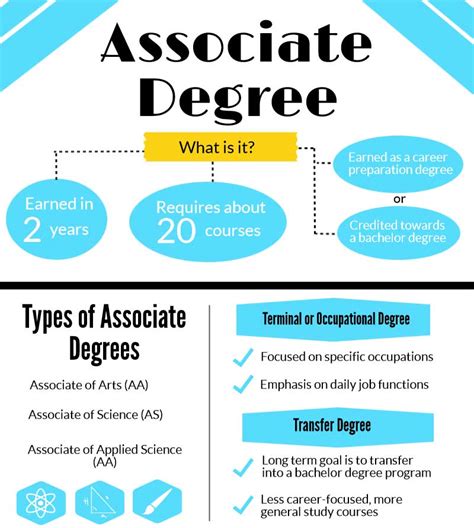Whether you’re a high school graduate looking to further your education or an adult professional seeking a career change, an associate’s degree can be an excellent option to enhance your skills and knowledge. But how long does it take to get an associate’s degree?

Understanding Associate’s Degrees
An associate’s degree is a two-year post-secondary qualification that typically prepares students for entry-level positions in various fields. These programs are offered at community colleges, technical schools, and some four-year universities.
Timeframe for Completion
The duration of an associate’s degree program varies depending on the following factors:
- Course Load: Full-time students typically take 12-18 credit hours per semester, while part-time students take fewer courses.
- Program Length: Associate’s degrees typically consist of 60-72 credit hours, which can take anywhere from two to three years to complete.
- Transfer Credits: If you have previously completed college coursework, you may be able to transfer those credits towards your associate’s degree, potentially reducing the time to completion.
Full-Time Enrollment
For full-time students taking an average of 15 credit hours per semester, here is the estimated time to completion:
- Two-Year Program: 2 years (assuming no breaks or summer courses)
- Three-Year Program: 3 years (allowing for breaks or summer courses)
Part-Time Enrollment
For part-time students taking an average of 6 credit hours per semester, here is the estimated time to completion:
- Two-Year Program: 4-5 years (assuming no breaks or summer courses)
- Three-Year Program: 5-7 years (allowing for breaks or summer courses)
Factors Affecting Time to Completion
In addition to the aforementioned factors, other variables can influence the time it takes to get an associate’s degree, including:
- Academic Performance: Students who maintain good grades and pass all their courses will progress faster through the program.
- Course Availability: Availability of required courses and class times can impact scheduling and potentially extend the time to completion.
- Financial Aid: Financial constraints may force students to reduce their course load to manage expenses, potentially extending the timeframe.
- Life Circumstances: Unexpected events or personal commitments may require students to pause or reduce their course load, delaying completion.
Benefits of an Associate’s Degree
Earning an associate’s degree offers several benefits, including:
- Career Advancement: It can qualify you for entry-level positions in various fields, including healthcare, information technology, and business.
- Higher Earnings: Graduates with an associate’s degree typically earn more than those with only a high school diploma.
- Improved Job Security: In certain industries, an associate’s degree can provide a competitive edge and increase job security.
- Preparation for Further Education: An associate’s degree can serve as a stepping stone towards a bachelor’s degree or other higher-level qualifications.
Tips for Success
To maximize your chances of completing your associate’s degree on time, consider the following tips:
- Plan Ahead: Research the program requirements, consider your course load, and plan your schedule accordingly.
- Study Regularly: Dedicate time to studying outside of class to reinforce the material and improve your understanding.
- Attend Class: Regular attendance is crucial for keeping up with the coursework and avoiding potential delays.
- Seek Support: Utilize academic support services such as tutoring, writing centers, and advising to enhance your learning experience.
- Manage Your Time: Prioritize tasks, create a study schedule, and stick to it as much as possible.
Conclusion
The time it takes to get an associate’s degree varies depending on several factors, including program length, course load, and personal circumstances. Full-time students can typically complete an associate’s degree in two to three years, while part-time students may take four to seven years or more. Earning an associate’s degree offers numerous benefits, including career advancement, higher earnings, and improved job security. By planning ahead, studying diligently, and seeking support, you can maximize your chances of success and attain your educational goals.
FAQs
Q: Can I complete an associate’s degree faster than two years?
A: Yes, if you enroll full-time, take more than 15 credit hours per semester, and attend summer courses.
Q: How many credit hours are required for an associate’s degree?
A: Typically 60-72 credit hours, but it may vary depending on the program.
Q: Can I transfer credits from another college to an associate’s degree program?
A: Yes, some colleges allow for the transfer of credits from accredited institutions.
Q: What are the job prospects for associate’s degree graduates?
A: Graduates can pursue entry-level positions in various fields, including healthcare, information technology, and business.
Q: Is an associate’s degree better than a high school diploma?
A: Yes, an associate’s degree offers more career opportunities, higher earning potential, and job security.
Tables
Table 1: Full-Time Enrollment Timeframe
| Program Length | Time to Completion |
|---|---|
| Two-Year Program | 2 years (no breaks or summer courses) |
| Three-Year Program | 3 years (allowing for breaks or summer courses) |
Table 2: Part-Time Enrollment Timeframe
| Program Length | Time to Completion |
|---|---|
| Two-Year Program | 4-5 years (no breaks or summer courses) |
| Three-Year Program | 5-7 years (allowing for breaks or summer courses) |
Table 3: Factors Affecting Time to Completion
| Factor | Description |
|---|---|
| Course Load | Number of credit hours taken per semester |
| Academic Performance | Grades and passing rate of courses |
| Course Availability | Availability of required courses and class times |
| Financial Aid | Constraints may force students to reduce course load |
| Life Circumstances | Unexpected events or personal commitments may delay completion |
Table 4: Benefits of an Associate’s Degree
| Benefit | Description |
|---|---|
| Career Advancement | Qualify for entry-level positions in various fields |
| Higher Earnings | Graduates typically earn more than high school diploma holders |
| Improved Job Security | Provides a competitive edge in certain industries |
| Preparation for Further Education | Serves as a stepping stone towards a bachelor’s degree |
